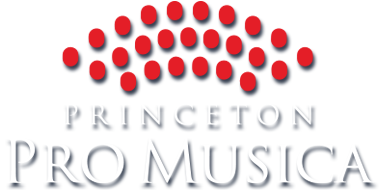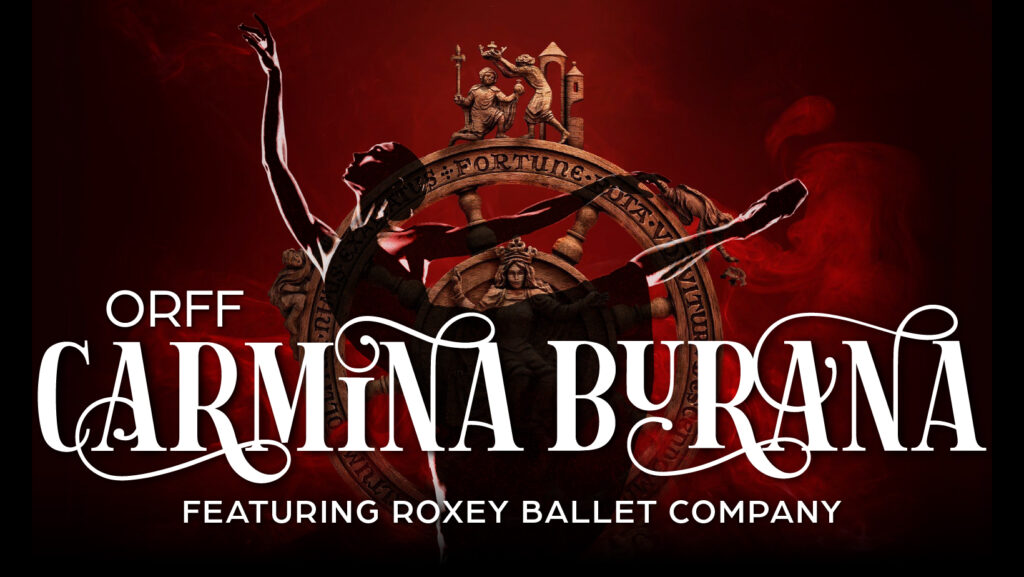The Creation
The Creation
Elisse Albian, soprano
Brian Giebler, tenor
Edmund Milly, bass-baritone
November 10, 2024
4:00 p.m.
Pre-concert talk, 3 P.M.
Richardson Auditorium
Princeton University
The Creation
Elisse Albian, soprano
Brian Giebler, tenor
Edmund Milly, bass-baritone
November 10, 2024
4:00 p.m.
Pre-concert talk, 3 P.M.
Richardson Auditorium
Princeton University
This performance is made possible in part by the generous support of Candace Preston, Catherine Preston Connolly, and Chris Preston, in loving memory of her husband and their father Marvin Preston, a former member of Princeton Pro Musica.
Click above to listen to the Director's Notes
Use Up/Down Arrow keys to increase or decrease volume.
After spending most of his adult life ensconced comfortably as head of music at the grand palace court at Esterházy, Franz Josef Haydn, at 68, began a new chapter of his career. The music-loving Prince Nikolaus died and was succeeded by his son, Anton. Haydn’s duties were greatly curtailed. Comfortably situated with a pension and the freedom to travel, he was more a free agent than he had ever been. He accepted an offer to travel to London from the savvy impresario Johann Peter Salomon. In London, Haydn not only had the opportunity to compose for large orchestras and create his most mature, developed symphonies but also to behold choral music making in its most grandiose form. By that point, some thirty years after his death, Handel had been lionized and embraced as a national treasure, his oratorios and ceremonial works performed frequently, beefed up to gargantuan proportions the likes of which Haydn had never experienced. Haydn returned to Austria and settled in Vienna, where his friend, mentor, and librettist, the Baron Von Swieten tried to entice him to try his hand at oratorio. When Haydn embarked on his second trip to London (August 1795), he was toting a libretto in English on the subject of the Creation story, which Salomon had given to him. Von Swieten supplied the English-shy composer with an amended version in German. Haydn started writing in early 1796 and finished in 1798. A version of the oratorio with both English and German text was published in 1800.
Structurally, The Creation operates as many oratorios do, combining solo recitatives, solo arias, and chorus, all accompanied by orchestra in a series of movements, divided into large sections. The story is told in the first two parts, by three archangels who appear in Milton’s Paradise Lost: Raphael (bass), Uriel (tenor), and Gabriel (soprano). In the description of each day, the music tends to come first, pre-describing what the soloists will outline. As each day unfolds, they describe what’s happened and then wax poetically, with quotes from the Book of Genesis and lyrical glosses on Milton’s Paradise Lost. The chorus vociferously cheers on each step along the way with grand paeans and psalm paraphrases. In the first four days, we see the formless void of chaos take on shape and yield to order. God delineates light and darkness, sky and earth, sea and land, sun and the moon, and sets spinning the cycles and seasons underpinning the tempo of all life. Plentitudes of flora spring from the earth. The fifth and sixth days see the creation of Earth’s animals and humankind itself, in the form of Adam and Eve.
Musically, The Creation is assured and splendid. The score—instantly a success—showcases a seasoned composer, more than one hundred symphonies under his belt, at the height of his powers. It’s quintessentially Classical, reflecting the beautiful balance of form and filigree so characteristic of the architecture and formal gardens of that period, but featuring in lieu of symmetrical eaves or square planted plots with tendrils of vines, pleasingly proportioned musical phrases and a sonic brocade embroidered with quick moving melismas, decorated with trills and turns. Music is sound, of course, but Haydn does his utmost to evoke the splendor of fields and flowers, verdant and fragrant, and the diverse delights of the creatures that swim the seas, soar through the sky, and gallop and creep across earth’s surface—a menagerie in music. Haydn, by all accounts, held a straightforward, cheerful faith (he, as Bach did, signed all his scores solo dei gloria). One wants to believe he found deep joy in the world around him, which his God created.
Conceptually, The Creation is conspicuously prelapsarian: all of its action takes place before “the fall,” before Adam and Eve have eaten the forbidden fruit. Adam and Eve begin happily, walking hand in hand unashamedly naked, tending to (not toiling in) their beautiful, bountiful garden, feasting on its fruits. But it’s impossible, for me at least, not to think about the missing, more consequential second half of the story. The sanguine, blissful account stands in sharp relief to those who currently feel neither blissful nor sanguine. After their transgression, they’re driven out of Eden. The ground is cursed to bear thorns and thistles and provide them food only through the sweat of their brow. Childbirth will be painful. And most consequentially, they will now know death, and return to the dust from which they were made. It’s right there, in the title of the Milton poem that’s a source for the oratorio’s libretto: paradise, lost. What paradises have we lost? How far, how fast, have we fallen?
The majority of The Creation comprises revelry in the splendor of the natural world. Have we lost that paradise? Though the Book of Genesis recounts the world’s creation in six days, the cosmos has unfolded on a timescale whose units of measure—eons, eras, millennia—our brains can barely comprehend. And so most read the story reconciling the six “days” with the four or five billion years the earth has been around and the hundreds of millions of years it’s been home to animals, during which a variety of processes, some moving glacially, some in eruptive fits and starts, have shaped the planet that the modern humans writing and reading the Bible inhabit. Almost as hard to comprehend as those eons is the accelerated change seen in the Anthropocene, as humankind’s attempts to find or regain earthly and economic Edens have altered the world itself.
In Genesis 1, God beckons the earth bring forth all living things. In the very next breath, he bids his newly created humans “be fruitful and multiply, and fill the earth and subdue it; and have dominion . . . over every living thing that moves upon the earth.” The Creation’s libretto heralds “man, the lord and king of nature all.” At the end of the story, Adam and Eve are banished from their pristine paradise and told that they and all of mankind will have a laborious relationship to the land. Famine and privation animate ancient biblical stories and today’s headlines alike. Those who can afford it emulate the perpetual fecundity of Eden. Consumers enjoy an unnatural always-in-season bounty, but at great, hidden, cost. Rainforests bulldozed into factory farms and palm oil plantations. Sub-tropical cash crops sprouting from the deserts of the southwest, gulping the remaining dribbles of diverted and dammed rivers. Our attempts to recreate our own latter-day Edens, too, are not without cost. The stately rolling hills, grand stands of trees, and perfected vistas of some of the most celebrated estates of the 18th and early 19th century necessitated the razing of small villages, felling of forests, and clearing of “wastes,” the vast wealth required for such decades-long efforts extracted via the enslaving of Africans in trans-Atlantic colonies. In the late 20th and 21st centuries, tracts of modern McMansions arise from lot after lot of manicured monoculture lawn. The reality of “every living thing,” too, has changed. The 2022 Living Planet Report from the World Wildlife Fund documents a devastating 69% drop on average in monitored populations of vertebrates globally since 1970.
And yet Haydn’s Creation, and its solos especially, reflect and rekindle our unshakable connection to Earth and some innate understanding of our symbiotic relationship to it. We haven’t lost the sense of wonder Creation captures. Darwinian-era botanists’ taxonomies evoke that pesky notion of “dominion.” But the endless litanies of Latin names betray a pride of place—canadensis, cambrigeiensis, virginicum—and enumerate the bewildering variety of plants in our world. When I stand amidst my own quarter-acre garden, I’m awestruck by shades, textures, and shapes. The plants aim merely to photosynthesize and, if they’re lucky, reproduce, but they do so with an almost lurid variety of enticements. The lacy delicacy of wild carrots’ bruise-mauve flowers. The perfect, pointy radial symmetry of dahlia petals. The sword-shaped leaves of irises guarding the coquettish curve and flop of their blossoms. Foxgloves’ towers of peach and pink bells. Lavender, its foliage starchy and scratchy, its scent powdery and soft. Refocus your eyes and you’ll see, everywhere, gluttonous bees supping on the sweetness of it all. Turn the earth, and a squirming shovelful reminds you that more than 95% of the described animal species on earth are invertebrates (they’ll outlive us all). I’m certain I’m not the only one who cherishes how much of earth’s paradise remains to us. Through the eyes of an infant newly able to waddle through it, the natural world is a paradise of novel sensory inputs. Attendance at National Parks is at an all-time high. Thousands throng to New York City’s own Olmsted-designed Eden, Central Park. During the first spring of the Covid pandemic lockdown, the Burpee company reported its highest sale of seeds ever, and Instagram feeds filled with photos of newly cherished houseplants.
The latter parts of Haydn’s Creation depict the harmonious relationship of Adam and Eve, to each other, and to God. Does that original human relationship represent a certain perfection from which we have fallen away? The politics of paradise in Genesis have long played a role in the way humans cultivate their relationships among themselves and govern. In Genesis, God chastises Adam and Eve for the choice they made to eat the forbidden fruit. The very first line of Milton’s Paradise Lost sets the terms explicitly: “Of man’s first disobedience, and the fruit of that forbidden tree, whose mortal taste brought death into the world, and all our woe.” At issue here is God’s gift of sovereignty and free will, and the tug of war between obedience and autonomy. Princeton University’s historian of early Christianity, Elaine Pagels, wonders: “Are human beings capable of governing themselves? [In the first three centuries of Christianity] defiant Christians hounded as criminals by the Roman government emphatically answered yes. But in the fourth and fifth centuries, after the emperors themselves became patrons of Christianity, the majority of Christians came to say no.” In those first few centuries, converts and emperor-defying martyrs, and writers such as St. John Chrysostom saw in the notion of “in God’s own image” a God-given moral freedom to rule oneself and saw “imperial rule,” with its force and coercion, “[epitomizing] the social consequences of sin.” In the late fourth and early fifth century, the church father Augustine gleans from the same story human bondage to sin. Pagels paints the bigger picture: “Early Christian spokesmen, like Jews before them and the American colonists long after, had claimed to find in the biblical creation account divine sanction for declaring their independence from governments they considered corrupt and arbitrary.”
Milton himself had supported the creation of an English republic in the mid-1600s, arguing in his prose against tyranny and state-sanctioned religion, advocating for the abolition of the Church of England. In the space of little more than a decade, a king was beheaded, a Commonwealth was piloted, and a new king was coronated. After the restoration of the monarchy, he feared for his safety. At the very same time that Haydn was visiting London and composing The Creation, a group of men across the Atlantic in America were two decades deep into their daring experiment in free will and sovereignty (for some), even as Napoleon was putting an end to the French revolutionary experiment in liberté, fraternité et egalité. In the mid 19th century, as industrialization swept England and the US and workers increasingly moved from work in nature to work in factories, a preponderance of utopian, communal living experiments came and went, and newly imagined utopian political systems took form. In upstate New York’s so-called “burned over district” preachers portended creation’s counterpart in the end of days. The United States saw recurring cycles of boom and bust, perennial rebirth every so many decades. At the time of writing these thoughts down, the American presidential election is still a few days away, looming large in my thoughts. Some claim our country is failing, after the fall, and seek to make the country “great again;” others hopefully seek “a new way forward.” With any luck, by the time we gather on November 10, there will be a definitive result. But this won’t be our last election; every four years we dare to consider what paradise of self-government we could cultivate, as we take the chance to alter the political landscape.
At the very end of Paradise Lost, an angel leads Adam and Eve out of the garden. They turn around and see its gate guarded by angels and an array of flaming swords, shed a tear, and move on. In Milton’s poetry:
In either hand the hastening Angel caught
Our lingering parents, and to the eastern gate
Led them direct, and down the cliff as fast
To the subjected plain; then disappeared.
They, looking back, all the eastern side beheld
Of Paradise, so late their happy seat,
Waved over by that flaming brand, the gate
With dreadful faces thronged and fiery arms.
Some natural tears they dropped, but wiped them soon;
The world was all before them, where to choose
Their place of rest, and Providence their guide:
They hand in hand, with wandering steps and slow,
Through Eden took their solitary way.
The author Olivia Laing, in The Garden Against Time, notes:
Milton used the model of horticultural cultivation as a way of considering good government, right relationship between different kinds of beings. Eden runs on very different principles to the autocratic rule of heaven. If God lays down laws and punishes transgressions, Adam and Eve practice a style of custodianship that is understated and benign. When they prop a rose or twist a vine into an elm, they are active collaborators in an interconnected ecology, subtly stage-managing processes that are already underway in order to maximize abundance and pleasure. That this blissful state of affairs comes to an end doesn’t drain it of its power. Despite its title, Paradise Lost is not exactly nostalgic. The garden serves as a kind of lodestar, an experience of nurture and richness that cannot be dismantled and might in future be recreated.
Who among us doesn’t have some lost paradise of our own—a sepia-toned childhood memory, a past youthful love, a cherished home now far away in time or place, a period in our lives when everything seemed to be swimming along? Perhaps the potency of paradise as a concept is its impossibility, its utility its precariousness. Perhaps we’re drawn to it because we feel so acutely in our own lives the way our most cherished practices and places—our marriages, our friendships, our gardens—must be tended. The final four lines of Milton’s poem are pregnant with possibility and remind us that life is lived in the pursuit of a paradise that reflects the best version of it we can dream of.
I’m biased, to be sure, but the longer I pursue my life’s work in music, the more fervently I have faith that what we’re doing when we partake in concerts is its own kind of paradise and pursuit of possibilities. Like all large-scale major choral-orchestral works, Haydn’s Creation as it exists as a permanent piece of art—as a score—isn’t so much a creation as it is a blueprint for one. To bring it into being and live within it, musicians and audience must create it anew each time with their materials, sound and space. This process of re-cultivation demands cooperative labor, careful listening, compassion, and trust. Music might just offer the best template for recapturing paradise in our own time. Harmony is the antonym of discord; unison, the absence of division; synchronization, the antithesis of disintegration. Even if it lasts for just an hour or two, we can dwell together in that paradise. It is in regathering this community, and re-sounding this musical idea into a fleeting reality, that our music making reminds us that creation is always possible. As winter sets in and the results of our quadrennial election become clear, let us be reminded that our gardens can always be regrown, through our own mindful, loving, cooperative cultivation.
The Creation
Joseph Haydn (1732-1809)
The First Day
1. Introduction and Recitative: In the beginning
2. Aria (tenor) and Chorus: Now vanish before the holy beams / A new created world
The Second Day
3. Recitative (bass): And God made the firmament
4. Solo (soprano) and Chorus: The marv'lous work beholds amazed
The Third Day
5. Recitative (bass): And God said, Let the waters
6. Aria (bass): Rolling in foaming billows
7. Recitative (soprano): And God said, Let the earth bring forth grass
8. Aria (soprano): With verdure clad the fields appear
9. Recitative (tenor): And the heavenly host proclaimed the third day
10. Chorus: Awake the harp, the lyre awake
The Fourth Day
11. Recitative (tenor): And God said, Let there be lights in the firmament
12. Recitative (tenor): In splendour bright
13. Chorus with soli: The heavens are telling
-Intermission-
14. Recitative (soprano): And God said, Let the waters bring forth
15. Aria (soprano): On mighty pens uplifted soars
16. Recitative (bass): And God created great whales
17. Recitative (bass): And the angels struck
18. Trio (soprano, tenor, bass) with Chorus: The Lord is great
19. Recitative (bass): And God said, Let the earth bring forth the living creatures
20. Recitative (bass): Straight opening her fertile womb
21. Recitative (tenor): So God created man in his own image
22. Aria (tenor): In native worth and honour clad
23. Recitative (bass): And God saw ev'ry thing that he had made
24. Chorus: Achieved is the glorious work
25. Recitative (tenor): In rosy mantle appears
26. Chorus with soli (soprano, bass): By thee with bliss
27. Recitative (soprano, bass): Our duty we have now performed
28. Recitative (tenor): O happy pair, and ever happy still
29. Chorus with soli: Sing the Lord, ye voices all
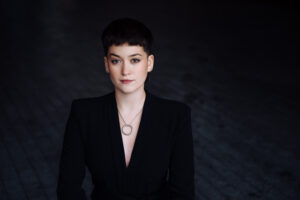 Praised by OperaWire for their “bright and glimmering soprano,” Elisse Albian finds delight in presenting oratorios, opera, choral compositions, and all that resonates in between.
Praised by OperaWire for their “bright and glimmering soprano,” Elisse Albian finds delight in presenting oratorios, opera, choral compositions, and all that resonates in between.
Elisse’s artistic collaborations extend to prestigious groups like The Choir of Trinity Wall Street, Seraphic Fire, Apollo’s Fire, Opera Lafayette, The Clarion Choir, Ensemble Altera, Voices of Ascension, Musica Sacra, Teatro Nuovo, Artefact Ensemble, and The Benedict XVI Choir. A crowning achievement in Elisse's journey was securing first place at the Lyndon Woodside Oratorio-Solo Competition hosted by the Oratorio Society of New York at Carnegie Hall.
Recently, Elisse made their Lincoln Center debut in the role of Etelia in the modern premiere of Anna di Resburgo, an opera by Carolina Uccelli, with Teatro Nuovo. In the upcoming season, Elisse looks forward to performing as a soloist frequently with The Choir of Trinity Wall Street in their performances of BWV 32 Liebster Jesu, mein Verlangen, Handel’s Messiah, and J.C. Bach’s cantata Meine Freundin, du bist Schon. Other season highlights include performing as the soprano soloist in Bach’s St. John Passion with the American Classical Orchestra.
Elisse had an exciting 2023-2024 season performing as a featured soloist in works such as Handel's Solomon alongside Princeton Pro Musica, Handel’s Dixit Dominus with Musica Sacra, and Britten’s Les Illuminations with Kollective366. In the winter, Elisse made their Kennedy Center debut joining Opera Lafayette for a performance of Moreau and Handel’s Esther.
Elisse completed a Bachelor’s of Music at the University of California, Los Angeles and recently graduated with a Master of Music in Voice at Mannes (The New School). They reside in Brooklyn, New York.
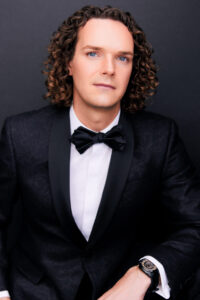 Praised for his “lovely tone and deep expressivity” by The New York Times, GRAMMY® nominated tenor Brian Giebler radiates “shine and clarity” (Opera News) in every phrase using “his high-placed tenor with great skill” (Opera Magazine). His debut solo album a lad's love garnered high praise from Gramophone, Opera News, and San Francisco Classical Voice, and earned him his first GRAMMY® Award nomination for Best Classical Solo Vocal Album.
Praised for his “lovely tone and deep expressivity” by The New York Times, GRAMMY® nominated tenor Brian Giebler radiates “shine and clarity” (Opera News) in every phrase using “his high-placed tenor with great skill” (Opera Magazine). His debut solo album a lad's love garnered high praise from Gramophone, Opera News, and San Francisco Classical Voice, and earned him his first GRAMMY® Award nomination for Best Classical Solo Vocal Album.
Highlights of Mr. Giebler’s 2024/25 season include debuts with the Colorado Symphony and Austin Symphony (Orff Carmina Burana), Handel Messiah with the Asheville Symphony, Handel Theodora with Ars Lyrica Houston, and return engagements with Voices of Ascension (Bach St. Matthew Passion; Evangelist), and Conspirare (Considering Matthew Shepard).
“The sweetness of Giebler's impressive high tenor” and his "expressive and elegant phrasing" (Cleveland Classical) have been heard as Apollo in Handel Semele with The English Concert under Harry Bicket; Stravinsky with The Cleveland Orchestra; Aeneas in Purcell Dido and Aeneas with Atlanta Baroque Orchestra; Arnalta in Monteverdi Poppea with Boston Baroque; Evangelist in Bach St. Matthew Passion with Trinity Wall Street; Bach Cantatas with the Grand Rapids Symphony and Handel & Haydn Society; Handel Messiah with Music of the Baroque (available on recording), internationally with the Seoul Metropolitan Chorus, and with the Charlotte, Rhode Island, and Memphis Symphonies; Orff Carmina Burana with the Milwaukee and Virginia Symphony Orchestras; Haydn Creation with Santa Fe Pro Musica; and on stage with Boston Modern Orchestra Project and Boston Early Music Festival. Other highlights included a tour of the Ravinia and Caramoor Festivals with Apollo’s Fire, and multiple works with Mark Morris Dance Group including Handel L’Allegro, il Penseroso. www.briangiebler.com
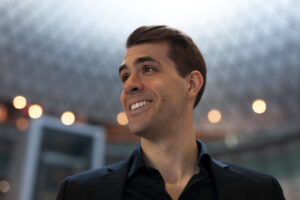 Bass-Baritone Edmund Milly is sought after for his “annunciatory power” (New York Times), “perfect diction” (Los Angeles Times), and distinctive “delicacy and personal warmth” (Boston Classical Review). This season brings his solo debuts with the Baltimore Symphony (in Stravinsky’s Renard) and the Lancaster Symphony (in Handel’s Messiah). Other recent solo engagements include Britten’s War Requiem with the Yale Symphony, Haydn’s Creation with the Washington Bach Consort, Mozart’s Mass in C Minor at the Oregon Bach Festival, and world premieres by Benedict Sheehan and Luna Pearl Woolf.
Bass-Baritone Edmund Milly is sought after for his “annunciatory power” (New York Times), “perfect diction” (Los Angeles Times), and distinctive “delicacy and personal warmth” (Boston Classical Review). This season brings his solo debuts with the Baltimore Symphony (in Stravinsky’s Renard) and the Lancaster Symphony (in Handel’s Messiah). Other recent solo engagements include Britten’s War Requiem with the Yale Symphony, Haydn’s Creation with the Washington Bach Consort, Mozart’s Mass in C Minor at the Oregon Bach Festival, and world premieres by Benedict Sheehan and Luna Pearl Woolf.
Edmund’s education began with cello lessons at age 3 and continued at the American Boychoir School, where he became steeped in the concert repertoire while singing under conductors such as Seiji Ozawa, Kurt Masur, Sir John Eliot Gardiner, and André Previn. Edmund holds degrees from McGill University and the Yale Institute of Sacred Music, where he studied with James Taylor. In his Lincoln Center solo debut with Yale Schola Cantorum led by Masaaki Suzuki, Edmund portrayed an "authoritative and confident" Jesus in Bach's St. John Passion (Seen and Heard International). He has since sung the role at Trinity Wall Street and the Oregon Bach Festival, and performed over 100 of Bach’s cantatas. Edmund made his Bachfest Leipzig debut in 2024, and cherishes his work with many of the organizations committed to bringing Bach’s music to life, including the Bach Choir of Bethlehem, Bach Akademie Charlotte, and Cantata Collective.
A veteran of the U.S. Army Band “Pershing’s Own,” Edmund has been a soloist at the White House, the Pentagon, and the U.S. Supreme Court. His recorded work includes solo credits on the BBC and CBC, and appearances on several GRAMMY-nominated albums. Edmund often has the good fortune to sing with his wife, mezzo-soprano Sylvia Leith, notably in their work with the Polyphonists, a vocal quartet they co-founded. For a full calendar of upcoming performances, see www.edmundmilly.com.
Haydn The Creation
Part One
The First Day
1. Introduction and Recitative (Raphael)
In the beginning God created the heaven and the earth.
And the earth was without form and void;
And darkness was upon the face of the deep.
Chorus
And the Spirit of God moved upon the face of the waters;
And God said, Let there be light:
and there was light.
Recitative (Uriel)
And God saw the light, that it was good:
and God divided the Light from the darkness.
2. Aria (Uriel) with Chorus
Now vanish before the holy beams
The gloomy dismal shades of darkness
The first of days appears.
Disorder yields and order fair prevails;
Affrighted flee hell’s spirits black in throngs;
Down they sink in the deepest abyss to endless night.
Chorus
Despairing cursing rage attends their rapid fall.
A new-created world springs up at God’s command.
The Second Day
3. Recitative (Raphael)
And God made the firmament,
and divided the waters which were under the firmament
from the waters which were above the firmament;
and it was so.
Outrageous storms now dreadful arise;
As chaff by the winds are impelled the clouds.
By heaven’s fire the sky is enflamed,
And awful roll the thunders on high.
Now from the floods in steams ascend
Reviving showers of rain,
The dreary wasteful hail,
the light and flaky snow.
4. Aria (Gabriel) with Chorus
The marv’lous work beholds amazed
The glorious hierarchy of heav’n,
And to th’ ethereal vaults resounds
The praise of God,
And of the second day.
The Third Day
5. Recitative (Raphael)
And God said,
Let the waters under the heaven be gathered together unto one place,
and let the dry land appear: and it was so.
And God called the dry land Earth;
and the gathering of waters called he Seas;
and God saw that it was good.
6. Aria (Raphael)
Rolling in foaming billows
Uplifted roars the boist’rous sea.
Mountains and rocks now emerge:
Their tops into the clouds ascend.
Through open plains outstretching wide,
In serpent error rivers flow.
Softly purling glideth on
Through silent vales the limpid brook.
7. Recitative (Gabriel)
And God said,
Let the earth bring forth grass,
the herb yielding seed,
and the fruit tree yielding fruit after his kind,
whose seed is in itself upon the earth:
and it was so.
8. Aria (Gabriel)
With verdure clad the fields appear
Delightful to the ravished sense;
by flowers sweet and gay enhanced is the charming sight.
Here vent their fumes the fragrant herbs;
Here shoots the healing plant.
By loads of fruits th’ expanded boughs are pressed;
to shady vaults are bent the tufty groves;
The mountain’s brow is crowned with closed wood.
9. Recitative (Uriel)
And the heavenly host proclaimed the third day,
praising God and saying:
10. Chorus
Awake the harp, the lyre awake!
In shout and joy your voices raise!
In triumph sing the mighty Lord!
For the the heavens and earth has clothed in stately dress.
The Fourth Day
11. Recitative (Uriel)
And God said,
Let there be lights in the firmament of heaven to divide the day from the night,
and to give light upon the earth:
and let them be for signs, and for seasons,
and for days, and for years.
He made the stars also.
12. Recitative (Uriel)
In brightest splendour rises now the sun,
And darts his rays;
An eager, joyful bridegroom,
A giant glad and proud to run his measured course.
With gentle steps and softer sil’vry beams
Steals the moon through still and silent night.
The boundless span of heaven’s vault
Is now adorned with numberless golden stars,
And the sons of God announced the fourth day thus,
In song divine, with joy proclaiming his might:
13. Chorus with Trio
The heavens are telling the glory of God;
The firmament displays the wonder of his works.
Today that is coming speaks it the day;
PART TWO
The Fifth Day
14. Recitative (Gabriel)
And God said,
Let the waters bring forth abundantly the moving creature that hath life,
and fowl that may fly above the earth in the open firmament of heaven.
15. Aria (Gabriel)
On mighty pens uplifted soars the eagle aloft,
and cleaves the sky in swiftest flight to the blazing sun.
His welcome bids to morn the merry lark,
And cooing calls the tender dove his mate.
From ev’ry bush and grove resound
The nightingale’s delightful notes;
No grief affected yet her breast,
Nor to a mournful tale were tuned Her soft, enchanting lays.
16. Recitative (Raphael)
And God created great whales,
and ev’ry living creature that moveth.
And God blessed them, saying,
Be fruitful all, and multiply!
Ye winged tribes, be multiplied and sing on ev’ry tree!
Multiply, ye finny tribes, and fill each wat’ry deep!
Be fruitful, grow, and multiply!
And in your God and Lord rejoice.
17. Recitative (Raphael)
And the angels struck their immortal harps,
and the wonders of the fifth day sung.
18. Trio with Chorus
The Lord is great, and great his might.
His glory lasts for ever and for evermore.
The Sixth Day
19. Recitative (Raphael)
And God said,
Let the earth bring forth the living creature after his kind,
cattle and creeping thing, and beasts of the earth after their kind.
20. Recitative (Raphael)
Straight opening her fertile womb,
the earth obeys the word,
and teem creatures numberless,
in perfect form and fully grown.
Cheerful, roaring, stands the tawny lion;
In sudden leaps the flexible tiger appears;
The nimble stag bears up his branching head.
With flying mane and fiery look impatient neighs the sprightly steed;
the cattle in herds already seek
Their food on fields and meadows green.
And o’er the ground, as plants are spread the fleecy, meek, and bleating flocks.
Unnumbered as the sands, In whirls arise the host of insects.
In long dimensions creeps with sinuous trace the worm.
21. Recitative (Uriel)
So God created man in his own image,
in the image of God created he him;
male and female created he them.
He breathed into his nostrils the breath of life,
and man became a living soul.
22. Aria (Uriel)
In native worth and honour clad,
With beauty, courage, strength adorned,
To heav’n erect and tall he stands a man,
The lord and king of nature all.
The large and arched brow sublime.
Of wisdom deep declares the seat,
And in his eyes with brightness shines the soul.
The breath and image of his God.
With fondness leans upon his breast
The partner for him formed,
A woman, fair and graceful spouse.
Her softly smiling virgin looks,
Of flow’ry spring the mirror,
Bespeak him love, and joy, and bliss.
23. Recitative (Raphael)
And God saw ev’ry thing that he had made,
and, behold, it was very good.
And the heavenly choir in song divine thus closed the sixth day:
24. Chorus.
Achieved is the glorious work,
Our song must be the praise of God!
Glory to his name for ever!
He sole on high exalted reigns. Alleluia.
PART THREE
25. Recitative (Uriel)
In rosy mantle now appears
By sweetest sounds awak’d,
The morning, young and fair.
From heav’n’s eternal realm,
Pure harmony descends on ravish’d earth.
Behold the blissful pair,
As hand in hand they go.
Their radiant eyes shine
with heartfelt joy and thanks.
And so with cheerful noise
their God they soon will praise.
then let our voices ring.
United with their song.
26. Chorus with Soli (Adam & Eve)
By thee with bliss, O bounteous Lord,
The heav’n and earth are filled.
This world, so great, so wonderful,
Thy mighty hand has framed.
Chorus
For ever blessed be his pow’r!
His name be ever magnified!
Adam
Of stars the fairest
O how sweet Thy smile at dawning morn!
How bright’nest thou, O sun, the day,
Thou eye and soul of all!
Chorus
Proclaim in your extended course
The glorious pow’r and might of God.
Eve
And thou that rul’st the silent night,
And all ye starry host,
Spread wide and ev’rywhere his praise
In choral songs about.
Adam
Ye strong and cumbrous elements,
Who ceaseless changes make,
Ye dusky mists, and dewy steams,
Who rise and fall through the air:
Resound the praise of God our Lord!
Chorus
Ye living souls, extol the Lord!
Him celebrate, him magnify!
Adam & Eve
Ye valleys, hills, and shady woods,
Our raptured notes ye heard;
From morn to ev’n you shall repeat
Our grateful hymns of praise.
Chorus
Hail, bounteous Lord! Almighty, hail!
Thy word called forth this wondrous frame.
Thy pow’r adore the heav’n and earth.
We praise thee now and evermore.
27. Recitative
Adam
—Our duty we have now performed
In off’ring up to God our thanks.
Now follow me, dear partner of my life!
Thy guide I’ll be, and ev’ry step
Pours new delights into our breast, shows wonders ev’rywhere.
Then may’st thou feel and know
The high degree of bliss the Lord allotted us,
And with devoted heart his bounty celebrate.
Come follow me!
Thy guide I’ll be.
Eve
O thou, for whom I am!
My help, my shield, my all!
Thy will is law to me.
So God, our Lord, ordains,
And from obedience grows
My pride and happiness.
28. Recitative (Uriel)
O happy pair, and ever happy still,
Unless, by false conceit misled,
Ye strive at more than granted is,
And more would know than know you should!
29. Chorus with Soli
Praise the Lord, ye voices all!
Utter thanks, all ye his works!
Celebrate his pow’r and glory!
Let his name resound on high!
The Lord is great; his praise shall never end.
Amen.
The End
| SOPRANO
Rose Ananthanayagam TENOR |
ALTO
LaVerna Albury
BASS |
| Violin Urara Mogi, concertmaster Keats Dieffenbach Cheng-Chih Kevin Tsai William Barney Stevens Linda Howard Jimmy Drancsak Violin II Viola Cello Bass |
Flute Reva Youngstein Gretchen Pusch Oboe Clarinet Bassoon Horn Trumpet Timpani Harpsichord Personnel Manager |

As of spring 2024, Henry Burt has finished his fourth year of doctoral studies. His dissertation is tentatively titled, “The Weariness of the Perfectionist: A Pastoral Theological Approach to Healing.” In this work, Henry addresses perfectionism as a psychopathological construct as he seeks to equip ministers with a healing approach built on playing in order to attend to those who suffer from perfectionism. Henry’s primary research interests include pastorally addressing matters of shame, identity crises, achievement culture, athletics, and the care of men. He takes a strong psychoanalytic approach, incorporating theories of playing from D.W. Winnicott; religious experiences from William James; and embodied theopoetics in service to identity transformation from Gloria Anzaldua.
Henry graduated with an MDiv from Princeton Theological Seminary in 2019. He spent the year prior to returning to Princeton fulfilling the ordination process as an ELCA pastor. He graduated from St. Olaf College in 2016 with degrees in both psychology and exercise science.
Apart from his studies, Henry enjoys competitive running, choral singing, attending sporting events, traveling, and church ministry in surrounding Lutheran churches. In the last two years he has served as interim pastors for Portuguese- and Spanish-speaking Lutheran congregations in the greater New York City area. He has called Dallas, Chicago, Minneapolis-St. Paul, Ottawa, and, most recently, Santa Fe home.
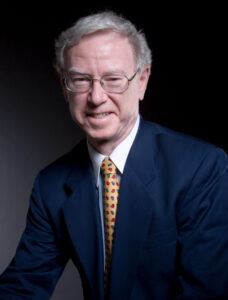 Marvin Preston was a dedicated member of Princeton Pro Musica for many years. Today's performance is made possible in part by the generous support of his wife, Candace Preston, and his children, Catherine Preston Connolly and Chris Preston. Click here to read more about Marvin's remarkable life and contributions to the world of the arts.
Marvin Preston was a dedicated member of Princeton Pro Musica for many years. Today's performance is made possible in part by the generous support of his wife, Candace Preston, and his children, Catherine Preston Connolly and Chris Preston. Click here to read more about Marvin's remarkable life and contributions to the world of the arts.
Princeton Pro Musica wishes to thank the following individuals and organizations for providing their special help:
Discover Jersey Arts
Innvoke Print and Marketing Solutions
Princeton Area Community Foundation
Princeton Mercer Chamber of Commerce
Regina Opera Company for their Supertitles template
Timothy Carpenter - Supertitles Operator
Baroque Keyboards
VOLUNTEER COORDINATOR
Janet Breslin
AUDITIONS COORDINATOR
Janet Perkins
BOOKKEEPER
Maureen Kyle
CONCERT HOUSE STAFF
Kevin Dziuba
CONCERT MANAGER
Dianne D. Miles
DIGITAL PROGRAM
Dianne D. Miles
CHAMBER CHORUS COORDINATOR
Fran Perlman
MUSIC COORDINATOR
Kim Neighbor
Bernard McMullan
OFFICE ASSISTANT
Janet Perkins
OUTREACH COORDINATOR
Nina Lucas
SECTION LEADERS
Candus Hedberg, soprano
Kim Neighbor, alto
Gary Gregg, tenor
Devon Grant, bass
SUPERTITLES OPERATOR
Timothy Carpenter
WEBMASTER
Kenny Litvack
